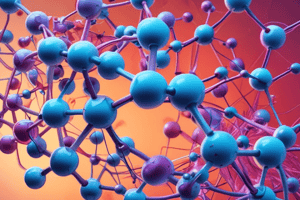Podcast
Questions and Answers
What is the molecular formula of ethene?
What is the molecular formula of ethene?
C2H4
Give an example of an alkene.
Give an example of an alkene.
Propene
What type of bonds do alkynes contain?
What type of bonds do alkynes contain?
Triple bonds (C≡C)
Name an aromatic compound.
Name an aromatic compound.
What are functional groups in organic compounds?
What are functional groups in organic compounds?
What is a common example of a substitution reaction?
What is a common example of a substitution reaction?
What is the central building block of organic chemistry?
What is the central building block of organic chemistry?
Define alkanes in organic chemistry.
Define alkanes in organic chemistry.
What are alkenes in organic chemistry?
What are alkenes in organic chemistry?
What type of bonds characterize the structures of organic compounds?
What type of bonds characterize the structures of organic compounds?
How is organic chemistry related to the natural world?
How is organic chemistry related to the natural world?
What makes carbon unique in organic chemistry?
What makes carbon unique in organic chemistry?
What are the fundamental molecular building blocks of organic chemistry?
What are the fundamental molecular building blocks of organic chemistry?
Flashcards are hidden until you start studying
Study Notes
Exploring the World of Organic Chemistry
Organic chemistry is a fascinating and diverse field within the broader discipline of chemistry. It deals with the study of carbon-containing compounds, which are the building blocks of the natural world we inhabit. From the intricate molecular structure of DNA to the aromatic complexity of a rose's scent, organic chemistry plays a pivotal role in understanding and harnessing the power of life's building blocks.
Carbon: The Cornerstone of Organic Chemistry
Carbon is the sixth element on the periodic table, and it has a unique ability to form strong covalent bonds with itself and other elements. This versatility makes carbon the central building block of organic chemistry. Organic compounds can have up to several hundred carbon atoms, and their structures are characterized by the presence of carbon-to-carbon (C-C) and carbon-to-heteroatom (C-O, C-N, C-S) bonds.
The Molecular Building Blocks of Organic Chemistry
Organic chemistry is built on the foundation of several fundamental molecular building blocks:
-
Alkanes: Consisting of only carbon and hydrogen atoms, alkanes are saturated hydrocarbons. Their molecular formulas are C_nH_(2n+2). Examples include methane (CH₄), ethane (C₂H₆), and propane (C₃H₈).
-
Alkenes: Also known as olefins, alkenes are unsaturated hydrocarbons with one or more carbon-carbon double bonds (C=C). Their molecular formulas are C_nH_(2n). Examples include ethene (C₂H₆) and propene (C₃H₆).
-
Alkynes: Similar to alkenes, alkynes are unsaturated hydrocarbons with one or more carbon-carbon triple bonds (C≡C). Their molecular formulas are C_nH_(2n-2). Examples include ethyne (C₂H₂) and propyne (C₃H₄).
-
Aromatic compounds: These compounds contain an aromatic ring, a cyclic structure with alternating single and double bonds. Aromatic compounds include benzene, naphthalene, and phenanthrene.
-
Functional groups: Organic compounds often contain functional groups, which are specific atoms or groups of atoms that confer unique chemical properties upon the compound. Examples include hydroxyl (-OH), carboxyl (-COOH), and amino (-NH₂) groups.
Synthetic Methods and Reactions in Organic Chemistry
Organic chemists use various synthetic methods and reactions to manipulate, transform, and create new organic compounds. Some of the most common methods include:
-
Substitution reactions: Reactions where the substitution of one functional group by another occurs. Examples include nucleophilic substitution reactions, such as the S_N2 reaction, and electrophilic substitution reactions, such as the Friedel-Crafts reaction.
-
Addition reactions: Reactions where new atoms or groups of atoms are added to the organic compound. Examples include nucleophilic addition reactions, such as the SN2' reaction, and electrophilic addition reactions, such as the Markovnikov addition of hydrogen bromide to alkenes.
-
Elimination reactions: Reactions where functional groups or atoms are removed from the organic compound. Examples include E1, E2, and E1cb elimination reactions.
-
Redox reactions: Reactions where the oxidation state of an atom or group of atoms changes. Examples include oxidation and reduction reactions.
Applications of Organic Chemistry
Organic chemistry has numerous applications across various industries and fields, including:
-
Pharmaceuticals: Organic compounds form the basis of many drugs and medicines, such as aspirin, penicillin, and ibuprofen.
-
Polymers: Organic compounds are used to create plastics, rubber, and other synthetic materials. Examples include polyethylene, polypropylene, and polystyrene.
-
Pesticides and herbicides: Organic compounds are used to develop environmentally friendly pest control and weed management strategies, such as neonicotinoids and glyphosate.
-
Flavors and fragrances: Organic compounds provide the aroma and flavor in food and beverages, as well as fragrances in personal care products.
-
Materials science: Organic compounds are used in the development of advanced materials, such as organic solar cells, organic light-emitting diodes, and organic electronic devices.
Organic chemistry continues to grow and evolve, offering new challenges and opportunities to researchers and scientists seeking to develop novel materials, drugs, and applications. With its broad applications and versatility, organic chemistry is a fascinating and vital field for understanding the world around us.
Studying That Suits You
Use AI to generate personalized quizzes and flashcards to suit your learning preferences.



